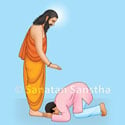Contents
- Natural Calamities – Earthquake
- 1. Signs of earthquake
- 2. Protective measures to be taken to be ready for an earthquake
- A. The importance of alertness, promptness and being patient
- B. Wind chimes help gauge the magnitude of the earthquake
- C. Identify the safe areas to hide during an earthquake
- D. Important points regarding heavy luggage/objects in your house
- E. Keep the breakable items in locked cabinets
- F. Tightly secure the hanging items
- G. Fix cracks
- H. Install flexible and durable hoses
- 3. Steps to be taken during an earthquake
- 4. The aftermath of an earthquake
- 5. Steps to be taken after an earthquake
- A. First Aid after an earthquake
- B. Get out of the building if it is unsafe there
- C. Keep an emergency kit handy
- D. Check if there is any gas leakage or inflammable liquids
- E. Avoid being barefooted, and wear a helmet
- F. Before using the toilet
- G. Ensure the safety of pets and keep them tied
- H. If electricity supply is interrupted, use battery-operated radio for latest instructions
- I. Precautionary measures required for vehicles after an earthquake
- J. Help the Government agencies and other charitable organisations in rescue work
- 6. After an earthquake, if you get trapped under the rubble
- 7. Increase your spiritual strength to face natural calamities
Natural Calamities – Earthquake
If you live in an earthquake prone region, this article is for you! An earthquake is an intense shaking of Earth’s surface. No one can accurately predict an earthquake, its intensity or location. Hence, it is critical to remain alert, prompt and patient to avoid or reduce the loss in an earthquake. about the signs of earthquake, precursors, protective measures required and practical aspects to keep in mind while facing an earthquake.
|

1. Signs of earthquake
The following signs can be observed before an earthquake.
A. A low rumbling sound emanates from the earth.
B. Pots in a cabinet start shaking violently.
C. Cracks appear on the plaster of the walls, and some of that falls off.
D. Cracks appear on the walls; structurally weak and old houses collapse.
E. Geographical shifts occur on the surface; the surface of the earth moves up & down and sideways.
F. Cracks appear on roads; bridges, railings collapse and boulders come cracking down / fall.
G. Rail tracks bend, their alignment is disturbed.
H. Cracks appear even on solid dam walls.
I. Oceanic earthquakes give rise to Tsunami waves. These 100-300 feet waves can wreak havoc in the coastal areas.
2. Protective measures to be taken to be ready for an earthquake
A. The importance of alertness, promptness and being patient
No one can accurately predict an earthquake, its intensity or location. Hence, it is critical to remain alert, prompt and patient to avoid or reduce the loss of lives and property. Therefore, it is every citizen’s duty to create scientific awareness among the people. During an earthquake, many lives are lost due to the destruction of property, ensuing fear and associated stampedes.
B. Wind chimes help gauge the magnitude of the earthquake
Wind chimes should be hung to the ceiling as they help gauge the intensity of the earthquake. If their pleasant tinkling gets converted into noisy clanging, it’s a warning of a higher magnitude of an earthquake.
C. Identify the safe areas to hide during an earthquake
During an earthquake, you can take cover under a thick table top desk or stay close to the interior corners of your house. It is equally critical to identify dangerous places to hide and avoid them at any cost during an earthquake
D. Important points regarding heavy luggage/objects in your house
Do not keep heavy luggage or items in the higher shelves as they can easily fall over and pose a real danger under these circumstances. Also, as the items in them and other furniture can fall off easily, secure them to the walls with nails.
E. Keep the breakable items in locked cabinets
Keep heavy, fragile and precious items on the lower shelves. Glassware and crockery should be kept in a locked cabinets/cupboards. It is preferable not to have cabinets/cupboards with glass doors or mirrors and even large photo frames in your house. If you have these, keep them on the floor to minimise any loss.
F. Tightly secure the hanging items
Tightly secure the chandeliers and other hanging items; else, they may fall off. Better to remove them.
G. Fix cracks
Fix cracks as soon as they appear on the roof.
H. Install flexible and durable hoses
During an earthquake, there is a real possibility of a blast due to broken cooking gas hoses. Hence, as a precautionary measure, install flexible and durable hoses instead.
3. Steps to be taken during an earthquake
A. If your building is shaking violently, an attempt to get out can prove to be fatal. Instead, take cover under a strong desk or table and if this is not possible, try to cover your head and neck with your hands.
B. If your house or office is a part of a building, do not rush to get out of the building; instead, stay calm and try to get out in an orderly fashion. Under these circumstances, avoid using lifts.
C. During a higher magnitude earthquake, stay indoors – be it your house or office. Take cover under areas identified earlier as relatively safer under such circumstances. Use pillows to protect your head. Stay away from doors and windows.
D. Switch off the main electric supply. Also, put off the gas cylinder and stove as applicable.
E. If you are out in the open, stay where you are. At the same time, be careful to stay away from buildings, trees, electric poles and electric wires.
F. If you are in a vehicle, park it in an open and safe location and do not get out.
G. If you are close to a seashore or a river, try to reach higher ground and stay there for a while.
H. If you are on a hill or riding downhill, be careful to protect yourself from boulders.
4. The aftermath of an earthquake
After an earthquake, you will find the ruins of buildings wherever you see. Injured people run helter-skelter either to help the badly injured or seek medical aid for themselves. The entire area gets engulfed by dust clouds. Many people get buried under rubble while thousands are seen dead. A few get trapped inside a partially collapsed building, and their morale is very low. Injured people desperately call for help, but in some places, even cellular network is unavailable due to widespread destruction. The electric supply gets interrupted. The fire brigade, ambulances and volunteers of charitable organisations cannot reach in time on account of badly damaged roads.
5. Steps to be taken after an earthquake
A. First Aid after an earthquake
Check if you have been injured and then either get first aid from others or do it yourself.
B. Get out of the building if it is unsafe there
Inspect your house or building for signs of damage. After an earthquake, a few lower magnitude tremors can follow, which may cause your building to collapse. Hence, if you believe your building is unsafe, help people get out of the house/building.
C. Keep an emergency kit handy
Keep the battery/torch from the kit handy as it helps locate items from the kit during power shortages.
D. Check if there is any gas leakage or inflammable liquids
Check if there has been any leakage of cooking gas. Additionally, make sure that inflammable liquids (such as kerosene and oil) do not spill on the floor or other objects. Once you make sure that there is no gas leakage and no flammable substance in the vicinity, you may proceed either to switch the electric supply on or to light a fire in your stove.
E. Avoid being barefooted, and wear a helmet
There can be broken pieces of glass and metal sheets on the floor. Hence, wear sandals or shoes as walking barefoot may cause injury to your feet. If possible, wear a helmet.
F. Before using the toilet
Use the toilet only after ensuring that the drainage system and pipes are intact.
G. Ensure the safety of pets and keep them tied
Pets such as cats and dogs may display behavioural changes – unprovoked anxiety, stress, pacing, increased activity, continuous barking or meowing. Keep them tied at a safe location to ensure their safety; else, they may run helter-skelter and get lost eventually.
H. If electricity supply is interrupted, use battery-operated radio for latest instructions
It may take a considerable amount of time for the electricity supply to resume after an earthquake. During this time, a battery-operated portable radio may prove to be quite useful as latest news and instructions are broadcast.
I. Precautionary measures required for vehicles after an earthquake
Do not drive unless necessary. This will speed up relief and rescue work and facilitate the rapid movement of vehicles. Empty roads are necessary for smooth operation of relief work.
J. Help the Government agencies and other charitable organisations in rescue work
Many people get killed as buildings collapse. Many dead bodies do not get recognised as they get crushed under the rubble. The family members of the dead are heartbroken and need to be dealt with carefully. In such a situation, help the members of Government agencies such as the Police, Ambulance, Fire-fighters, and other volunteers in identifying the deceased.
K. Stay away from seashores. We cannot rule out a possibility of a Tsunami after an earthquake.
L. If the situation compels you to vacate your home, leave a note about your whereabouts.
M. Avoid taking bridges and flyovers as they may have been damaged.
N. Don’t enter any dilapidated buildings.
6. After an earthquake, if you get trapped under the rubble
If you get trapped under the rubble, do not light a matchstick, as leaked gas or any inflammatory substance can ignite easily; and it may set the adjacent material on fire. As far as possible, cover your face with a piece of cloth. Knock on the pipe or wall or whistle for seeking help. It will help preserve some of your energy. If this does not help, shout as a last resort.
7. Increase your spiritual strength to face natural calamities
Do not feel scared by the increasing coronavirus outbreak all over and strengthen your inner-self by taking autosuggestions ! Read more @ www.sanatan.org/en/a/107667.html
To read more information must read Holy Texts available on SanatanShop.com

 Cold wave : How to deal with it ?
Cold wave : How to deal with it ? How to deal with disasters such as World War, earthquakes, etc. ? (Part 3)
How to deal with disasters such as World War, earthquakes, etc. ? (Part 3) Landslides : How to deal with it ?
Landslides : How to deal with it ?